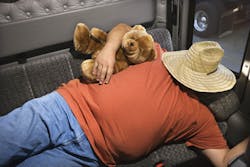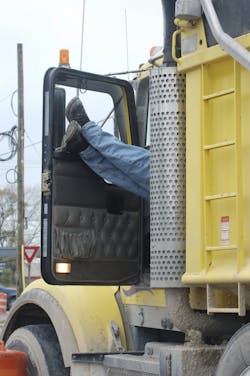FMCSA awards $2.5 million to study split sleeper impact
The Federal Motor Carrier Safety Administration (FMCSA) has taken the next step in making hours of service (HOS) limits more flexible, awarding a $2.5 million contract for researchers to study a safety provision that will allow truck drivers to split their required 10-hour sleeper berth time into shorter periods.
Virginia Tech, along with subcontractors from Washington State University and SmartDrive will conduct the study. This comes as FMCSA deals with a number of requests from carriers for exemptions that would permit team drivers to split their sleeper berth periods’ giving the opportunity to switch from the driving to resting more frequently.
Until a rule change in 2005, federal regulations had for decades allowed drivers to split their rest in sleeper berths. FMCSA’s rule change, which followed one of the several court cases involving the HOS rules since 2004, essentially eliminated split rest for solo drivers and allowed team drivers to split rest only in very limited circumstances.
The American Trucking Assn. proposed the study in December 2013, asking then-Administrator Anne Ferro asked for a two-year exemption for drivers selected for participation in the program.
“For some time now, sleeper berth drivers have called for flexibility with the hours-of-service requirements, and this study will provide the scientific foundation for FMCSA to understand what the safety benefits and impacts may be in allowing such flexibility,” said Rich Hanowski, director of the Center for Truck and Bus Safety at the Virginia Tech Transportation Institute and principal investigator for the study. “This pilot project will produce scientific data necessary to further inform FMCSA about this important safety issue that potentially affects the well-being of everyone traveling on our nation’s roads.”
“Keeping drivers and the motoring public safe is the top priority for our industry,” said SmartDrive CEO Steve Mitgang. “The onboard video monitoring system is uniquely capable of providing the insights required to understand the impact of flexible sleep schedules on driving.”
Collectively, the study will measure roadside violations, crashes and driver sleepiness.
“This study will examine the safety impact of providing participating drivers the opportunity to use a ‘sleep when you are sleepy’ strategy to manage their individual fatigue,” said Kimberly Honn, a post-doctoral researcher from Washington State University. “They will still be required to comply with the overall federal hours-of-service safety requirements, but during the study they will be allowed to exercise a degree of flexibility in logging sleeper berth time.”
The Center for Truck and Bus Safety has conducted approximately $50 million in safety-related research since the center was founded in 2005, including this year’s congressionally directed HOS restart study.
Hanowski notes that the new sleeper berth study already has received positive feedback, with several fleets expressing interest. Carriers that wish to find out more about the study are asked email Rebecca Hammond.
About the Author
Kevin Jones 1
Editor
Kevin has served as editor-in-chief of Trailer/Body Builders magazine since 2017—just the third editor in the magazine’s 60 years. He is also editorial director for Endeavor Business Media’s Commercial Vehicle group, which includes FleetOwner, Bulk Transporter, Refrigerated Transporter, American Trucker, and Fleet Maintenance magazines and websites.

